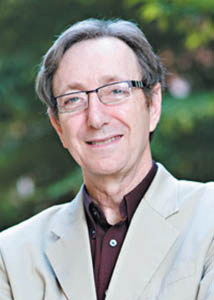
lt is perhaps inarguable that for most Orthodox Jewish parents, the path for their children is to get an education, meet the “right” person, get married, settle down and start a family.
That’s at least what Mindy Dickler, a Baltimore mother of three and a member of the Orthodox community, said she and her husband Marc had in mind for their three children.
But when their son Elie came home from college 5 1/2 years ago over Rosh Hashanah, waited two days and then told his parents he was gay, Mindy and her husband started on a journey that they are still processing.
“Do I tell my rabbi? Who among my relatives and friends do I trust to confide this information to? Suppose someone is critical or hurtful? What about my child? Is he safe?
These questions only scratch the surface of what Mindy and other Orthodox parents of LGBTQ children are asking.
That is where Eshel, an organization started with the express purpose of helping Orthodox parents of LGBTQ children find one another and ask questions of people who have had perhaps similar experiences and feelings, comes in.
“We need to bring the topic out of the closet,” Dickler told The Jewish Link’s affiliate publication Kol HaBirah. “In Baltimore we’re not talking about it. It’s a reality, it’s here, it’s not going away. If we don’t normalize it, we’ll have more broken families.”
From May 5-7, Eshel is holding its fifth annual parents’ retreat in Copake, New York. There are scholarships available for the event for Baltimore and Washington-area parents. More information about the conference and a “meetup” scheduled for May 8 in Baltimore can be found at eshelonline.org.
“At the retreat, we get to experience this amazing feeling of community with other parents of LGBT children,” said Dickler. It is common to feel isolated and alone in one’s own home community after a child comes out. Most times you don’t know if any other families are like you. There is a grieving process when a child comes out, especially if the parent had no idea.
And that was part of Dickler’s experience. She and her husband, she said, had no clue that their son was gay.
At the retreats, scheduled monthly conference calls and meetups, parents have an opportunity to come together in a safe space “where they can be their total selves,” she said. “It’s very validating and comforting and supportive.”
Dickler said that initially when their son came out, she and her husband reacted with love and acceptance.
“What happened with us, and what happens with a lot of parents, there’s a journey you go on,” said Dickler. “The journey of my future for my family is not going to be what I thought it was going to be.”
“When a child comes out of the closet, the parent goes into the closet,” she continued. “It takes a child a long time to understand themselves, and come out to themselves. In our case, bam, here’s reality, now deal with it.”
Dickler also said that when talking to family and close friends, initially it’s advisable to choose people who will give you a positive response.
“Any time you come out to an aged parent, a grandparent, your frum neighbor, your kid’s teacher, you don’t know if that person is going to give a homophobic reaction,” Dickler said. “You add on the layer of Orthodoxy, the stringencies are more part of your everyday life. So yes, the Orthodox component makes it that much harder. Some people will say everyone was created b’tzelem Elokim (in God’s image). Others go with Leviticus. They make that the stopping point.”
It’s the observance of Torah that Orthodox parents of LGBT children see sometimes as challenging to negotiate.
“It is painful when a person genuinely feels that his or her deeply felt identity is at odds with a deeply felt wish to be within their religious rules,” said Rabbi Simcha Feuerman, LCSW-R, a frum social worker who practices in the New York area. “It is natural to wish to come together as a group and support each other. Though I do not know about the work of this group (Eshel) in particular, such organizations can conduct themselves in both a halachically and psychologically appropriate manner. I am aware of individuals who have found various psychological and halachic approaches, but for many people a solution seems elusive. And for an organization to succeed at this task on a public level is certainly a work in progress.”
Rabbi Dr. Tzvi Hersh Weinreb, a psychotherapist and the executive vice president emeritus of the Orthodox Union, said, “The whole issue of homosexuality within Orthodoxy is very challenging and difficult. But the halachic parameters are very clear.”
He added that the issue of homosexuality is compounded by religious issues for Orthodox families. And while he wasn’t so familiar with Eshel, Rabbi Weinreb said that “anything that helps diminish suffering is useful. There’s a substantial number of people who want to be part of the Orthodox community in various ways. It’s challenging.”
For Dickler, though, Eshel is that safe space she can rely on, be it a meetup or retreat or phone call, and confidentiality is the rule of the game. Everyone is asked to agree to strict confidentially. Nothing said in that space will leave that space. It’s only because of that strict adherence, only because of the confidentially, that people can share things they might not be able to share in other circles.
Dickler told Kol HaBirah that life has gotten better through her participation in Eshel. She said her best friends are in New Jersey, Chicago, Boston, D.C. and Philadelphia.
“We have a common bond to be totally comfortable with one another,” she said. “It’s made all the difference in the world to me.”
By Phil Jacobs









